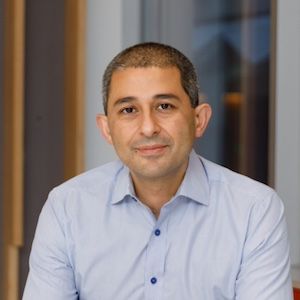
[ad_1]
Hooman Kamel, MD
Credit: LinkedIn

Results from the ARCADIA randomized scientific trial demonstrated apixaban didn’t considerably cut back recurrent stroke risk in contrast with aspirin amongst sufferers with cryptogenic stroke and proof of atrial cardiopathy without atrial fibrillation (AF).1
More than 1000 contributors within the multicenter, double-blind, part 3 scientific trial have been randomized to obtain apixaban 5 mg or 2 mg twice day by day or aspirin (81 mg) as soon as day by day. A staff of investigators from Weill Cornell Medicine discovered the annualized price of recurrent stroke didn’t considerably differ between the apixaban- and aspirin-treated sufferers, at 4.4% in each cohorts.
“In patients with a recent cryptogenic stroke and evidence of atrial cardiopathy based on 3 readily available biomarkers, oral anticoagulant therapy with apixaban did not significantly reduce the risk of recurrent stroke compared with aspirin,” wrote the investigative staff, led by Hooman Kamel, MD.
Kamel and colleagues got down to examine anticoagulation versus antiplatelet remedy for secondary stroke prevention amongst a inhabitants with cryptogenic stroke and proof of atrial cardiopathy. The ARCADIA trial concerned contributors with cryptogenic stroke and proof of atrial cardiopathy—this was measured as P-wave terminal drive ≥5000 µV x ms in electrocardiogram lead VI, serum N-terminal pro-B-type natriuretic peptide ≥250 pg/mL, or left atrial diameter index of ≥3 cm/m2 on echocardiogram.
The included inhabitants had no proof of atrial fibrillation (AF) on the time of randomization. Enrollment and follow-up came about from the start to the tip of February 2023 at 185 websites within the National Institutes of Health StrokeInternet and the Canadian Stroke Consortium. A complete of 507 folks acquired apixaban 5 mg or 2.5 mg twice day by day and 508 acquired once-daily aspirin (81 mg) throughout the research interval.
In the time-to-event evaluation of the ARCADIA trial, the first efficacy endpoint was recurrent stroke of any kind. Safety outcomes within the evaluation have been symptomatic intracranial hemorrhage and different main hemorrhage. The total inhabitants, together with these identified with AF after trial randomization, was assessed in response to their randomization task group.
A complete of 1015 contributors of the 1100 goal have been enrolled within the research, with a imply follow-up interval of 1.8 years. As the hazard ratio (HR) for apixaban versus aspirin lay throughout the pre-specified interim boundaries for futility, the trial was stopped after the deliberate interim evaluation. Participants had a imply age of 68.0 years, 54.3% have been feminine, and 87.5% accomplished the total follow-up interval.
Upon evaluation, the first final result of recurrent stroke was recognized in 40 sufferers within the apixaban group (annualized price, 4.4%) and 40 sufferers within the aspirin group (annualized price, 4.4%) (HR,1.00 [95% CI, 0.64 – 1.55]). A post-hoc evaluation carried out in 149 sufferers with AF documented after randomization additionally discovered no important distinction within the price of recurrent stroke between apixaban (annualized price, 1.8%) and aspirin (annualized price, 2.2%) (HR, 0.84 [95% CI, 0.19 – 3.74]).
Secondary efficacy outcomes of recurrent stroke or loss of life have been noticed in 67 sufferers within the apixaban group (annualized price, 7.3%) and 62 sufferers within the aspirin group (annualized price, 6.8%) (HR, 1.08 [95% CI, 0.76 – 1.52]). Safety outcomes confirmed symptomatic intracranial hemorrhage occurred in zero sufferers receiving apixaban and in 7 sufferers receiving aspirin (annualized price, 1.1%). Other main hemorrhages have been recognized in 5 sufferers receiving apixaban (annualized price, 0.7%) and 5 sufferers taking aspirin (annualized price, 0.8%) (HR, 1.02 [95% CI, 0.29 – 3.52]).
An accompanying editorial from Bruce Ovbiagele, MD, MSc, division of neurology, University of California, San Francisco, advised the ARCADIA trial doesn’t essentially conclude the power to deal with primarily based on the presence of atrial cardiopathy, unbiased of AF.2
Although final result analyses centered on inclusion standards didn’t obtain statistically important outcomes, Ovbiagele famous the purpose estimates favored safety with apixaban amongst these chosen utilizing P-wave terminal drive criterion and hurt amongst these with an elevated NT-proBNP degree.
“These data may then suggest that future efforts to identify optimal therapeutic strategies for patients with atrial cardiopathy should focus on markers as directly reflective of left atrial pathology as possible,” Ovbiagele wrote.
References
- Kamel H, Longstreth WT, Tirschwell DL, et al. Apixaban to Prevent Recurrence After Cryptogenic Stroke in Patients With Atrial Cardiopathy: The ARCADIA Randomized Clinical Trial. JAMA. Published on-line February 07, 2024. doi:10.1001/jama.2023.27188
- Marcus GM, Ovbiagele B. Anticoagulation for Atrial Cardiopathy in Cryptogenic Stroke. JAMA. Published on-line February 07, 2024. doi:10.1001/jama.2023.23916
[adinserter block=”4″]
[ad_2]
Source link